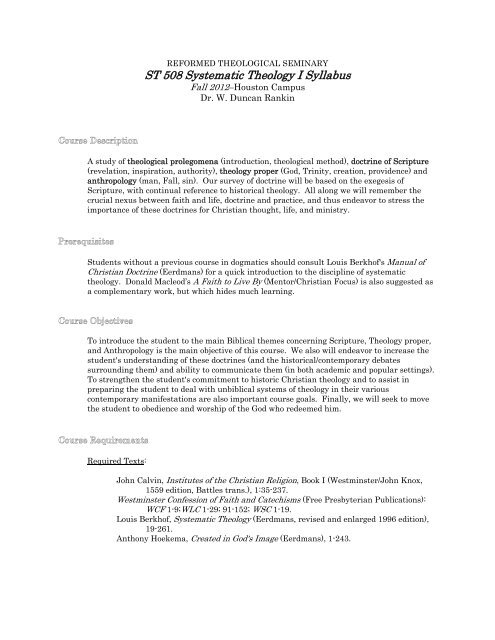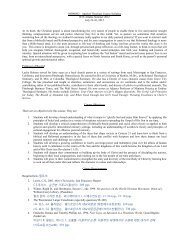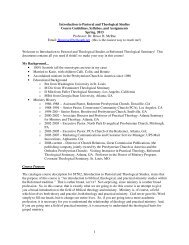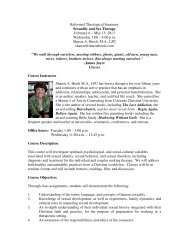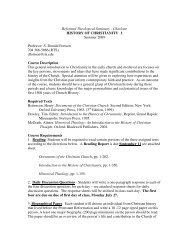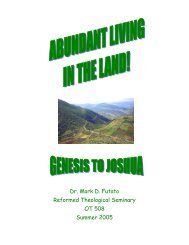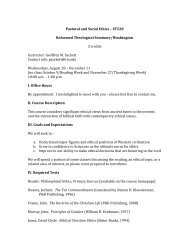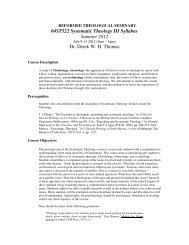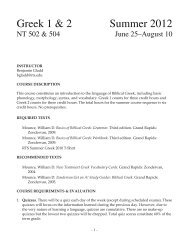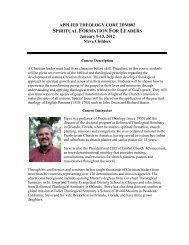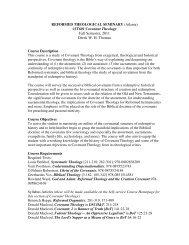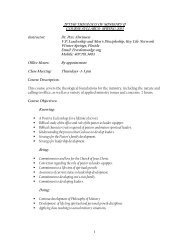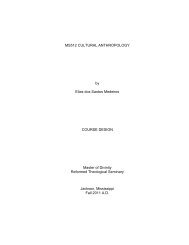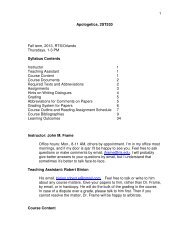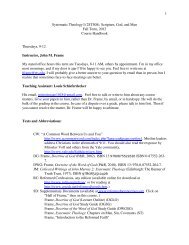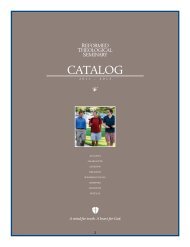Systematic Theology 1 - Reformed Theological Seminary
Systematic Theology 1 - Reformed Theological Seminary
Systematic Theology 1 - Reformed Theological Seminary
You also want an ePaper? Increase the reach of your titles
YUMPU automatically turns print PDFs into web optimized ePapers that Google loves.
REFORMED THEOLOGICAL SEMINARY<br />
ST 508 <strong>Systematic</strong> <strong>Theology</strong> I Syllabus<br />
Fall 2012–Houston Campus<br />
Dr. W. Duncan Rankin<br />
A study of theological prolegomena (introduction, theological method), doctrine of Scripture<br />
(revelation, inspiration, authority), theology proper (God, Trinity, creation, providence) and<br />
anthropology (man, Fall, sin). Our survey of doctrine will be based on the exegesis of<br />
Scripture, with continual reference to historical theology. All along we will remember the<br />
crucial nexus between faith and life, doctrine and practice, and thus endeavor to stress the<br />
importance of these doctrines for Christian thought, life, and ministry.<br />
Students without a previous course in dogmatics should consult Louis Berkhof's Manual of<br />
Christian Doctrine (Eerdmans) for a quick introduction to the discipline of systematic<br />
theology. Donald Macleod’s A Faith to Live By (Mentor/Christian Focus) is also suggested as<br />
a complementary work, but which hides much learning.<br />
To introduce the student to the main Biblical themes concerning Scripture, <strong>Theology</strong> proper,<br />
and Anthropology is the main objective of this course. We also will endeavor to increase the<br />
student's understanding of these doctrines (and the historical/contemporary debates<br />
surrounding them) and ability to communicate them (in both academic and popular settings).<br />
To strengthen the student's commitment to historic Christian theology and to assist in<br />
preparing the student to deal with unbiblical systems of theology in their various<br />
contemporary manifestations are also important course goals. Finally, we will seek to move<br />
the student to obedience and worship of the God who redeemed him.<br />
Required Texts:<br />
John Calvin, Institutes of the Christian Religion, Book I (Westminster/John Knox,<br />
1559 edition, Battles trans.), 1:35-237.<br />
Westminster Confession of Faith and Catechisms (Free Presbyterian Publications):<br />
WCF 1-9;WLC 1-29; 91-152; WSC 1-19.<br />
Louis Berkhof, <strong>Systematic</strong> <strong>Theology</strong> (Eerdmans, revised and enlarged 1996 edition),<br />
19-261.<br />
Anthony Hoekema, Created in God's Image (Eerdmans), 1-243.
Reading Seminar texts:<br />
1) Berkhof, Introductory Volume to <strong>Systematic</strong> <strong>Theology</strong> (Eerdmans , at front<br />
of revised and enlarged 1996 edition of <strong>Systematic</strong> <strong>Theology</strong>), 116-169.<br />
2) J.I. Packer, “Fundamentalism” and the Word of God (Eerdmans), 9-186.<br />
3) John Murray, “The Attestation of Scripture” in The Infallible Word (WTS<br />
Faculty), 1-55 [will be made available electronically].<br />
4) Karl Barth, Church Dogmatics I.1.Š4 (T. & T. Clark), 88-124 [will be made<br />
available electronically]; R.P.C. and A.T. Hanson, The Bible Without<br />
Illusions [SCM and TPI], 38-65 and 114-128 [[will be made available<br />
electronically].<br />
5) Tertullian, Contra Praxeas [will be made available electronically]; Basil, De<br />
Spiritu Sancto, ch 1-11 and 21-27 [will be made available<br />
electronically]; Augustine, De Trinitate, Book I [will be made<br />
available electronically].<br />
6) John Calvin, Institutes I.13 (Westminster/John Knox), 1:120-159; Heinrich<br />
Heppe, <strong>Reformed</strong> Dogmatics (George Allen & Unwin), ch 6, 105-132<br />
[will be made available electronically].<br />
7) Friedrich Schleiermacher, The Christian Faith (T. & T. Clark),Š 170-172,<br />
738-751 [will be made available electronically]; Karl Barth, Church<br />
Dogmatics I.1.Š8.3 (T. & T. Clark), 333-347 [will be made available<br />
electronically]; Gerald Bray, The Doctrine of God (IVP), 197-224.<br />
8) Donald Macleod, Shared Life (Christian Focus), 7-96.<br />
9) D.F. Kelly, Creation and Change (Christian Focus), 15-135.<br />
10) John Calvin, Institutes I.16-18 (Westminster/John Knox), 1:197-237.<br />
11) Thomas Aquinas, Summa Theologica, 1a QQ 90-101 [will be made<br />
available electronically].<br />
12) John Calvin, Institutes II.1-8 (Westminster/John Knox), 1:241-423.<br />
Class Attendance:<br />
Evaluation:<br />
Given the concentrated nature of the instruction hours, class attendance will be<br />
imperative for successful completion of this course.<br />
During lecture hours, questions are welcomed, but students are asked to hold them<br />
until asked for by the instructor.<br />
The class will be broken down into small groups for the Reading Seminars, giving<br />
more opportunity for interaction and discussion relevant to particular fields of<br />
interest. These periods will be times for students to rethink and answer any<br />
remaining questions they may have on a particular doctrine before moving on to the<br />
next. They will also serve as a check to make sure that the assigned readings are<br />
being completed and that material is being assimilated.<br />
Students are asked to bring their copies of the Westminster Confession of Faith and<br />
the Bible to class every day, as well as the particular texts under consideration.<br />
Because of its central and essential importance to the Gospel ministry, pour your<br />
heart, mind, and strength into the learning of this course. It will glorify God and<br />
2
less His people for years to come!<br />
1. Reading Seminars (20%)<br />
The class will be broken down into small groups for periodic reading<br />
seminars, giving more opportunity for interaction and discussion relevant to<br />
particular fields of interest. These periods will be times for students to<br />
interact and discuss the assigned readings. They will also serve as a check to<br />
make sure that the assigned readings are being completed and that their<br />
content is being assimilated into the lecture material. Reading Seminars are<br />
a time to rethink and answer any remaining questions students may have on<br />
a particular aspect of a doctrine before moving on to the next.<br />
Students will fill out a Reading Report Form on each assigned reading and<br />
bring it to class, turning it in at the end of their Reading Seminar. A schedule<br />
of seminar readings is given in the Reading Seminar texts list above.<br />
2. <strong>Theological</strong> Study Guide Questions (20%)<br />
Answers to the <strong>Theological</strong> Study Guide Questions which follow later in the<br />
syllabus should be typed and turned in with the Final Exam. See a sample<br />
question and answer after the listing of the questions themselves. While<br />
students may work in groups, all are reminded that each individual is<br />
responsible for the accuracy of the answers they turn in. Please include the<br />
page numbers on which you found your answer in Berkhof and other authors.<br />
3. Term Paper (20%)<br />
A 10-12 page theological paper is required for this course, critiquing some<br />
aspect of D.G. Bloesch’s Holy Scripture: Revelation, Inspiration and<br />
Interpretation (IVP). Students should peruse Bloesch, agreeing on a topic in<br />
advance with the professor. Term papers are due with the Final Exam.<br />
4. Final Exam (40%)<br />
The examination will test the student's mastery of all the material covered in<br />
the course lectures and reading and allow the student to apply principles<br />
learned in the course to theological test cases.<br />
EXTRA CREDIT (10%)<br />
Students may earn a significant portion of extra credit by reading and<br />
preparing a 8 page comparative analysis of John Frame’s The Doctrine of the<br />
Word of God (P&R) and R.C. Sproul’s Scripture Alone: The Evangelical<br />
Doctrine (P&R). Students should discuss the detailed academic nature of this<br />
extra credit paper with the professor before beginning such work.<br />
3
Part One: THE DOCTRINE OF GOD<br />
THE BEING OF GOD<br />
1. In what sense is God knowable, and in what sense unknowable?<br />
2. What is innate knowledge of God?<br />
3. What is acquired knowledge?<br />
4. Is it possible to know something of the very being of God?<br />
5. Is it possible to define God?<br />
6. What is involved in God's spirituality?<br />
7. What do we mean when we ascribe personality to God?<br />
8. How can His personality be proved?<br />
9. What is the divine infinity?<br />
10. How are the being of God and His perfections related?<br />
THE NAMES OF GOD<br />
11. What does Scripture mean when it speaks of the name of God in the singular?<br />
12. Are the special names of God of human origin?<br />
13. What is the general difference between the names 'El, 'Elohim, 'Elyon, 'Adonai, on the one hand,<br />
and Shaddai, 'El-Shaddai, and Jehovah, on the other?<br />
14. What is the specific meaning of each one of these names?<br />
15. What is the meaning of the name Kurios (Lord)?<br />
16. Is the name Father ever used of God in the Old Testament?<br />
17. In what different senses is it used in the New Testament?<br />
THE ATTRIBUTES OF GOD<br />
18. How do we divide the attributes of God?<br />
19. Which belong to each one of these classes?<br />
20. What is the independence of God?<br />
4
21. His immutability?<br />
22. How can we explain that the Bible apparently ascribes change to God?<br />
23. What is God's eternity and immensity?<br />
24. How can we prove the simplicity of God?<br />
25. What is the nature and extent of God's knowledge?<br />
26. How is His wisdom related to His knowledge?<br />
27. What is the goodness of God, and what other names are used for it?<br />
28. Should we speak of love as central in God?<br />
29. How do we distinguish God's grace, mercy, and longsuffering?<br />
30. What is the holiness of God?<br />
31. Under what different aspects can the righteousness of God be considered?<br />
32. What is included in the veracity of God?<br />
33. What distinction do we apply to the will of God?<br />
34. Is His will free or necessary?<br />
35. Does God's decree make Him the author of sin?<br />
36. Do the secret and revealed will of God conflict?<br />
37. Does God's omnipotence imply that He can do everything?<br />
THE TRINITY<br />
38. Can we discover the doctrine of the Trinity from nature?<br />
39. How do the persons in God differ from three persons among men?<br />
40. Is there any subordination of the persons in God?<br />
41. How can we prove the Trinity from the Old Testament?<br />
42. From the New?<br />
43. Against what errors should we guard in this doctrine?<br />
44. In how many different senses is the name "Father" applied to God? What works are especially<br />
ascribed to the Father?<br />
45. In how many different senses is the name "Son" applied to Christ? Is the generation of the Son a<br />
5
past act?<br />
46. What works are especially ascribed to the Son?<br />
47. How can you prove the divinity of the Son and the Holy Spirit?<br />
48. How can you prove that the Holy Spirit is a person, and not merely a power or influence?<br />
49. How is the Spirit related to the other persons?<br />
50. What works are especially ascribed to the Holy Spirit?<br />
51. What is the characteristic property of the Father, of the Son, and of the Holy Spirit?<br />
THE DIVINE DECREES IN GENERAL<br />
52. What is the divine decree?<br />
53. Why do we sometimes speak of decrees in the plural?<br />
54. Which are the characteristics of the divine decree?<br />
55. In what sense is it eternal?<br />
56. What is implied by the fact that the decree is efficacious?<br />
57. In what sense is it unconditional?<br />
58. What is included in the decree?<br />
59. What is the nature of God's decree respecting sin?<br />
60. What objections are raised against the doctrine of the decrees?<br />
61. What can be said in answer to these objections?<br />
PREDESTINATION<br />
62. How is predestination related to the decree of God in general?<br />
63. Who are the objects of the decree of predestination?<br />
64. How should we conceive of the predestination of the angels?<br />
65. In what sense is Christ the object of predestination?<br />
66. Which are the parts of predestination?<br />
67. In how many different senses does the Bible speak of election?<br />
68. What is election as distinguished from reprobation?<br />
6
69. What does the decree of reprobation include?<br />
70. What Scriptural proof is there for the doctrine of reprobation?<br />
71. Does this doctrine involve injustice on the part of God?<br />
72. What is the difference between Infra- and Supralapsarianism?<br />
CREATION<br />
73. What is creation?<br />
74. Was creation a free or a necessary act of God?<br />
75. How is God related to the world?<br />
76. What is meant by "the beginning" in Gen. 1:1?<br />
77. Is the word "create" always used in the same sense in Scripture?<br />
78. How can we prove that God created the world without the use of pre-existent material?<br />
79. What two views are there as to the final end of creation?<br />
80. In what sense is the glory of God the final end?<br />
81. What substitutes have been suggested for the doctrine of creation?<br />
82. What is the nature of the angels?<br />
83. What orders of angels are indicated in Scripture?<br />
84. What is the function of Gabriel and Michael?<br />
85. What is the work of the angels?<br />
86. What proof have we for the existence of evil angels?<br />
87. How should Gen 1:1 be interpreted?<br />
88. Were the days mentioned in Gen 1 ordinary days or long periods? Why?<br />
89. What did God create on each of the six days?<br />
90. Why is the doctrine of evolution inconsistent with the Biblical narrative of creation?<br />
91. Does the theory of creative evolution agree with Scripture?<br />
PROVIDENCE<br />
92. How is the doctrine of providence related to that of creation?<br />
7
93. What is divine providence?<br />
94. What is the deistic view of God's relation to the world?<br />
95. How does the pantheist conceive of this relation?<br />
96. What is the difference between general and special providence?<br />
97. Why do some deny special providence?<br />
98. Which are the objects of divine providence?<br />
99. What is meant by divine preservation?<br />
100. By divine concurrence?<br />
101. How should we conceive of this concurrence?<br />
102. To what difficult problem does it give rise?<br />
103. How far does the divine government extend?<br />
104. What is a miracle?<br />
105. Why are miracles considered by some to be impossible?<br />
Part Two: THE DOCTRINE OF MAN IN RELATION TO GOD<br />
THE CONSTITUTIONAL NATURE OF MAN<br />
106. What is the dichotomic view of the essential elements of human nature?<br />
107. How can this view be proved from Scripture?<br />
108. What is the trichotomic view?<br />
109. What Scriptural proof is advanced for it?<br />
110. What objections are there to this view?<br />
111. What theories are there as to the origin of the soul in the individual?<br />
112. What does Pre-existentianism teach?<br />
113. What is the Traducianist view?<br />
114. What arguments can be advanced in favor of it?<br />
115. What objections are there to it?<br />
116. What is the theory of creationism?<br />
8
117. What considerations favor this view?<br />
118. What objections are there to it?<br />
MAN AS THE IMAGE OF GOD AND IN THE COVENANT OF WORKS<br />
119. Why is the doctrine of the image of God in man important?<br />
120. Do the words "image" and "likeness" denote different things?<br />
121. What is the Roman Catholic view of the image and likeness of God in man?<br />
122. What is the Lutheran view of the image of God in man?<br />
123. What objection is there to this view?<br />
124. What distinction do the <strong>Reformed</strong> apply to the image of God in man?<br />
125. What constitutes the image of God in the restricted sense?<br />
126. In the more comprehensive sense?<br />
127. What Bible proof have we for the covenant of works?<br />
128. Which are the parties of the covenant?<br />
129. What are the promise, the condition, the penalty, and the sacrament of the covenant?<br />
130. In what sense does the covenant still hold?<br />
131. In what sense is it abrogated?<br />
MAN IN THE STATE OF SIN<br />
132. What is the Biblical view of the origin of sin?<br />
133. Can you name any other views?<br />
134. What was the first sin?<br />
135. Why was the tree concerned called "the tree of the knowledge of good and evil"?<br />
136. What elements can be distinguished in the first sin?<br />
137. Why did the tempter approach Eve?<br />
138. Can you prove that Satan was the real tempter?<br />
139. Which were the results of the first sin?<br />
140. Why is it undesirable to substitute the word "evil" for "sin"?<br />
9
141. Is it possible for man to occupy a neutral position, neither good nor bad?<br />
142. Is it correct to interpret sin with reference to man?<br />
143. How can we prove that sin includes guilt?<br />
144. Where does sin have its seat in man?<br />
145. How can we prove that sin does not consist exclusively in outward acts?<br />
146. What are the Pelagian, the Roman Catholic, and the evolutionary views of sin?<br />
SIN IN THE LIFE OF THE HUMAN RACE<br />
147. What different opinions are there respecting the connection between Adam's sin and that of his<br />
descendants?<br />
148. What is the realistic theory, and why is it objectionable?<br />
149. How does the doctrine of the covenant of works conceive of the connection between the sin of<br />
Adam and our sinful condition?<br />
150. What advantages has this view?<br />
151. What solution to the problem is suggested by the theory of mediate imputation?<br />
152. What objections are there to this solution?<br />
153. What is original sin?<br />
154. What two elements does it include?<br />
155. How should we conceive of man's total depravity?<br />
156. How must his total inability be understood?<br />
157. What is included in actual sin?<br />
158. How does actual sin differ from original sin?<br />
159. What is the nature of the unpardonable sin?<br />
160. Can there be any reasonable doubt as to the universality of sin?<br />
161. What explanation do some offer for this?<br />
162. How does the Bible account for it?<br />
10
1. In what sense is God knowable, and in what sense unknowable? p.29-30.<br />
God can been known through his attributes and nature expressed in his creation, but true knowledge<br />
of God is through special revelation, illuminated by the Holy Spirit. Though we can have knowledge<br />
of God, there are still elements of his divinity and essential being which are incomprehensible to us.<br />
See Romans 1:19-20; Westminster Confession of Faith I.1, VII; Westminster Larger Catechism 2-6;<br />
Westminster Shorter Catechism 2-3; Calvin, Institutes I.ii-iii,v-vi.<br />
The following reading guides are provided to aid the student in assimilation of the<br />
required reading. The questions put here should not be turned into the professor,<br />
but rather are best kept in mind as the relevant sections are read.<br />
J.I. Packer, 'Fundamentalism' and the Word of God (Grand Rapids, MI: 1958)<br />
pp. 9ff Can you summarize Packer's presentation of the bitter opposition to fundamentalism?<br />
p. 10 What are the differences between the nature of the Bible, the origin of the Bible, and the<br />
authority of the Bible?<br />
NB: Packer is primarily writing against Gabriel Herbert's book Fundamentalism and the Church<br />
of God, London: SCM Press, 1957.<br />
pp. 24ff Can you summarize the origin of the term "fundamentalism"?<br />
p. 25 Note the importance of Warfield and Machen<br />
pp. 25f How does Packer define "Liberal"?<br />
p. 28 Who were the Fundamentalists?<br />
pp. 31ff Trace the downgrade movement in American fundamentalism. Do you see any of this tendency<br />
in your own denominational circles?<br />
p. 33 "futuristic chiliasm" = premillennialist theory about the second coming of Christ<br />
p. 35 Are you guilty of the anti-intellectual, broad and superficial thinking that Machen so abhorred?<br />
p. 36 Why did Machen not like to be called a "Fundamentalist"?<br />
p. 37 How does the doctrine of the Holy Spirit protect against Liberalism?<br />
p. 41 NB: Packer's repeated use of the WCF as a historic doctrinal standard, even though he is not a<br />
Presbyterian.<br />
p. 43 Packer says we must expect Christendom to "always be a theological battlefield". Do you care<br />
enough about the truth of God's Word not to shirk from this? How will this battle manifest itself<br />
in your own ecclesiastical setting?<br />
p. 44 How pivotal is the issue of authority in doctrinal division?<br />
pp. 46ff What are the three rival views of authority? Describe each. Are elements of each found in your<br />
own denominational setting? Which is the proper one?<br />
11
p. 47 Discuss: "What Scripture says, God says."<br />
How does Packer describe the sufficiency and perspicuity of Scripture?<br />
p. 48 One prominent pastor's wife brags that she reads no book but the Bible. How would Packer<br />
respond to this boast?<br />
p. 49 How does an attack on the sufficiency and perspicuity of Scripture quite often lead to high<br />
churchism (e.g., "What the Church says, God says.")?<br />
NB: the Traditionalism described by Packer takes a variety of forms and is not just limited to the<br />
Roman Catholic Church. It especially includes the more common forms of Puseyism<br />
(e.g., appeals to the nebulous and non-existent "community of interpretation").<br />
What is "faith" for a Traditionalist? How does this contrast with the evangelical and <strong>Reformed</strong><br />
view of "saving faith" as involving notitia, assensus, and fiducia?<br />
p. 50 How can mysticism, rationalism, and combinations of these two all be forms of Subjectivism?<br />
Discuss: "What I find I feel, that God says."<br />
p. 51 What is "faith" for the Subjectivist?<br />
How can an evangelical pastor subtly fall into subjectivism? Could you ever do so?<br />
How can a Christian therapist subtly fall into subjectivism? Could you ever do so?<br />
p. 53 Note the importance of the Decalogue (i.e., the Ten Commandments) for our understanding of<br />
revelation. What special place do they hold in the history of the Church?<br />
pp. 54ff Summarize Christ's attitude toward the Old Testament.<br />
p. 61 Is there any tension between Christ and the Scriptures?<br />
p. 64 Footnote 2 mentions the book The Infallible Word, which is well worth having in your personal<br />
library for further study.<br />
p. 66 Did the Early Church make the canon? Why not?<br />
What is the criterion for canonicity?<br />
p. 73 NB: Packer's summary statement in the bottom paragraph.<br />
p. 76 What is the relationship between revelation and mystery?<br />
p. 77 Define "inspiration."<br />
NB: B.B. Warfield's important articles.<br />
pp. 78f Evangelicals are commonly charged by liberals (and especially Barthians) with holding to the<br />
dictation theory of inspiration. Do you? Do you believe God could not have used dictation at all<br />
in giving the Bible?<br />
pp. 80ff What is God's concursive operation in inspiration?<br />
p. 81 Can God and man be free agents in the same action?<br />
pp. 82ff How can the Christological Analogy be either properly or improperly applied to the doctrine of<br />
Scripture?<br />
p. 84 How is the both a library and more than a library?<br />
pp. 85ff Is it proper to call the Bible the Word of God? Why?<br />
p. 88 Is it technically proper to say the Bible contains the Word of God? Why may it, however, be<br />
practically unwise?<br />
12
p. 89 Name at least one Bible passage for which there has been exhaustive exegesis.<br />
Why does Packer insist upon verbal inspiration?<br />
p. 90 How is lower (i.e., textual) criticism different from higher criticism? Which is a heresy?<br />
Relate the doctrine of providence to Scriptural transmission.<br />
pp. 91ff Is revelation by action or instruction?<br />
p. 92 NB: verbal revelation = propositional revelation<br />
Without propositional revelation, you would go to hell. Why is verbal, propositional revelation<br />
required for your salvation?<br />
p. 93 Is Christ logical?<br />
pp. 93f Compare and contrast the form of the Bible and the Westminster Confession of Faith. Which is<br />
more literary and complex? Why?<br />
pp. 94ff Define "infallible."<br />
Define "inerrant."<br />
p. 95 Note with great care Packer's rather disturbing yet true observation: "Both ["infallibility" and<br />
"inerrancy"] have been so variously employed in theological discussion that they now bear no<br />
precise meaning at all."<br />
Why do you think this is so?<br />
How sound, then, is the idea that a commitment to the inerrancy of Scripture is the only creed a<br />
church needs?<br />
NB: American evangelicals developed the Chicago Statement on Biblical Inerrancy in response to<br />
just this problem of diverse definition. It is a very useful doctrinal statement. See N. Geisler's<br />
Inerrancy (Zondervan).<br />
NB: The Barthian theologian T.F. Torrance has recently attempted to redefine the term<br />
"inerrancy" in a decidedly Barthian direction. See T.F. Torrance, Karl Barth (1990), pp. 104-5.<br />
Why ultimately is the Bible inerrant?<br />
p. 96 Is the inerrant Bible always inerrantly interpreted?<br />
Does the Bible teach about everything in life?<br />
Where the Bible does touch on history or science, is it inerrant?<br />
Where the Bible does touch on the human mind, heart, or condition, is it inerrant? Does this<br />
mean that the Bible is a textbook or psychology? Does this mean that the Bible is irrelevant to<br />
the proper study of psychology?<br />
NB: the burning question is not whether the Bible and psychology should be integrated, but how<br />
each are to be handled and related. Modern psychological experts may well be wrong on certain<br />
matters to which the Bible touches, even though it is not a textbook on this matter per se.<br />
pp. 96f Does the poor Greek grammar of I Peter prove the Bible is inerrant?<br />
p. 98 Packer asks: "What is being asserted in this passage?" But to whom is he referring: the human<br />
author or the divine author?<br />
Is the intended scope of the human author of Scripture ever contrary to that of the divine author?<br />
Is the intended scope of the divine author ever beyond that of the human author?<br />
How can one know what the intended scope of the divine author is?<br />
In light of Packer's treatment, interact with the statement: "The intent of the human author of<br />
Scripture is Scripture."<br />
p. 99 Packer mentions "symbolic modes of representation in the story of Adam and Eve." What<br />
controls the extremes to which this concept can be pushed?<br />
pp. 100f How is a liberal view of Scripture inherently elitist?<br />
13
p. 101 NB: "God's Word is not present in Scripture in the form of a theological system, but...requires to<br />
be so stated...." How is this grounds for both systematic theology and church creeds?<br />
p. 102 "...the intended sense of the writer is to be taken as fundamental."<br />
pp. 102ff How does "literal interpretation" of Scripture avoid being literalistic?<br />
p. 105 What danger is Packer running in classing the Fall as a real yet symbolically portrayable event?<br />
Do you think his choice of this example wise?<br />
p. 106 What is the analogy of Scripture?<br />
p. 107 Are the Trinity and resurrection not found in the OT?<br />
Why is the clarity of the "central message" or "main truths" of the Bible so very important for<br />
preventing pure relativism?<br />
After preaching on the deity of Christ, one of your congregation members says, "Preacher, that's<br />
just your interpretation." How would you respond?<br />
p. 108 When you run up on two passages in the Bible you cannot harmonize, does that destroy the<br />
doctrine of inerrancy?<br />
Is it proper to argue from Christ and His authority to the authority and trustworthiness of the<br />
Bible, as Packer does? Why would some forms of presuppositional apologetics go counter to this<br />
approach?<br />
p. 109 How is humility an important prerequisite to preaching and teaching God's Word? Who is to<br />
judge whether you are gifted in this matter?<br />
p. 113 Has biblical criticism been a help or a hindrance to the Church's knowledge of the Word of God?<br />
p. 115 What is the nature of faith?<br />
p. 116 What is the proper basis for credence?<br />
p. 118 How is the illumination of the Holy Spirit vital to proper Bible study?<br />
p. 119 NB: VERBAL REVELATION HAS NOW CEASED!!!<br />
p. 120 Do you quite subtly hold to Coleridge's view of inspiration?<br />
Compare and contrast Coleridge and Calvin on inspiration and illumination.<br />
What is the self-authentication of Scripture<br />
p. 123 How does heresy begin?<br />
Just because someone loves the Lord, does this mean that all his teaching of the Bible will be<br />
orthodox? What heresy have you mistakenly taught before?<br />
p. 127 Packer says: "...facts, as such, are sacred." Why?<br />
pp. 128ff What are the three tasks of reason? Explain each.<br />
pp. 129f How does truly "scientific criticism" operate?<br />
p. 131 If all facts and truths are God's property, then why not teach Physical Chemistry, Booulian<br />
Algebra, or Sex Education in Sunday School?<br />
p. 132 Are you a Manichean or do you have a biblical world and life view? Are you sure?<br />
Are you captive to a 19th Century individualistic outlook, or have you begun to think through the<br />
implications of the Biblical categories of community and society?<br />
14
p. 135 Which takes precedent for a biblical Christian: special or natural revelation? Upon which do you<br />
primarily rely in your counseling when in doubt or they are in conflict?<br />
p. 136 Why is application of biblical principles to all of life so vital for evangelism and discipleship?<br />
pp. 137f What are Gnosticism, Arianism, Deism, and Liberalism?<br />
p. 139 Where does sin have its root in your life?<br />
How is a critical treatment of Scripture a grave moral lapse? Do you really fear and abhor it as<br />
such?<br />
pp. 140f Are faith and reason antitheses?<br />
What are "the assured results of biblical criticism"?<br />
p. 142 NB: When Packer wrote this book, old Liberalism was dead and the (un)Biblical <strong>Theology</strong><br />
Movement was in full swing. Today, that movement has collapsed and a multi-faith inclusivism<br />
has come to the fore in key intellectual circles.<br />
p. 143 Who is really free? Are you?<br />
pp. 146ff Describe Old Liberalism, identifying its place in history, laudable goals, key assumptions, and<br />
key features.<br />
p. 147 How was Old Liberalism both scientific and culturally minded?<br />
p. 148 Friedrich D.E. Schleiermacher (1768-1834) = the father of modern theology and author of The<br />
Christian Faith who began his Christian life as a pious Moravian. Look him up in the New<br />
Dictionary of <strong>Theology</strong> (NDT) by IVP.<br />
evolution = "the master idea" of Liberalism for every area of study<br />
p. 149 Adolf von Harnack (1851-1930) = critical church historian and major exponent of the liberal<br />
Ritschlian theology. See NDT.<br />
p. 151 Packer's prediction was correct: Liberalism did not really die. It merely shed its 19th Century<br />
parochialism and metamorphed into a mixture of skepticism and inclusive pluralism, all the<br />
while clinging religiously to its critical treatment of Scripture.<br />
Critique the Biblical <strong>Theology</strong> Movement. How does it differ from the kind of biblical theology<br />
practiced by Patrick Fairbairn, Gerhardus Vos, and Palmer Robertson?<br />
p. 153 How is the Biblical <strong>Theology</strong> Movement in principle still liberal?<br />
p. 155 What does the New Liberalism do to the woman in the pew?<br />
How real is an appeal to the unanimous consent of the experts, whether they be in the modern or<br />
early church?<br />
pp. 158f Define myth.<br />
NB: Rudolph Bultmann (1884-1976) is now the standard theologian by which all on the<br />
Continent are measured, far beyond even Karl Barth (1886-1968) or Emil Brunner (1889-1966).<br />
See NDT.<br />
p. 159 Neo-Orthodoxy = a 20th Century somewhat amorphus theological movement which sought a new<br />
direction for theology in reaction to Old Liberalism by first returning to Reformation roots. The<br />
precise boundaries of neo-orthodoxy are disputed, in as much as it is a term of derision!<br />
However, in common PCA usage it includes such diverse figures as Karl Barth, Emil Brunner,<br />
Rudolph Bultmann, Friedrich Gogarten, Paul Tillich, C.H. Dodd, Donald Baillie, Reinhold<br />
Niebuhr, and T.F. Torrance.<br />
How does neo-orthodoxy easily decay into mysticism?<br />
15
pp. 160ff List four ways Packer says Liberalism is wrongheaded.<br />
p. 162 True or false: To err is human?<br />
Why do we not only fight for the "essentials" of the Christian faith? How does this encourage the<br />
church to embrace a full-bodied creed instead of an emaciated one?<br />
pp. 167f What is the most effective and theologically informed way to witness to an unbelieving<br />
generation?<br />
Does your own preaching and teaching reflect a minimist liberal-like agenda or a full-orbed<br />
evangelicalƒ<strong>Reformed</strong> one?<br />
p. 170 Do you agree with Packer that Subjectivism is a version of Christianity, or is it something<br />
profoundly different than Christianity?<br />
John Calvin, Institutes of the Christian Religion (1559)<br />
The following questions form a suggested guide for your reading of Calvin. Their purpose is to help you<br />
have a more carefully constructed and thoughtful reading of this material. These questions were<br />
crafted by the great Southern Presbyterian Theologian, James Henley Thornwell, for students at<br />
Columbia <strong>Theological</strong> <strong>Seminary</strong>. They are pre-eminently designed for candidates for the ministry, and<br />
have been used toward this purpose for over a century. It is hoped that they will help introduce the<br />
future pastors of this class to the thought of the great Reformer. These questions can also be found<br />
(along with a brief analysis of Calvin) in the appendix of Volume One of the Collected Writings of<br />
James Henley Thornwell.<br />
CHAPTER I.<br />
1. In what sense does Calvin use the term Wisdom?<br />
2. What is the propriety of this use?<br />
3. What is the sense attached to it in the Scriptures, particularly in the Proverbs of Solomon?<br />
4. What was the use of it with Plato and Aristotle?<br />
5. In what does wisdom principally consist?<br />
6. What is the scope of the first chapter?<br />
7. Show how the knowledge of ourselves conduces to the knowledge of God. Generalize Calvin's three propositions<br />
upon this point.<br />
8. Show how the knowledge of God conduces to the knowledge of ourselves. Generalize the proposition and give the<br />
illustration.<br />
9. What effect has the presence of God clearly manifested, even upon good men, and why? Illustrate by instances.<br />
10. Recapitulate the chapter.<br />
CHAPTER II.<br />
1. What is the scope of this chapter?<br />
2. What kind of knowledge does Calvin mean? Discriminate it from two other kinds of knowledge of God.<br />
3. What is the question in regard to God which this knowledge answers?<br />
4. Can we answer the question, Quid sit Deus?<br />
5. Recapitulate.<br />
CHAPTER III.<br />
1. What is the connection of this chapter with the preceding?<br />
2. What does Calvin mean by saying that the knowledge of God is natural?<br />
3. What is the doctrine of innate ideas combated by Locke?<br />
4. What is the true doctrine in relation to a priori cognitions?<br />
5. Are Calvin's expressions liable to any just censure?<br />
6. What is the proof that the knowledge of God is natural?<br />
7. What are the recognized criteria of primitive truths?<br />
16
8. Show that a sense of religion is universal.<br />
9. Answer the objection that religion is the invention of politicians.<br />
10. Show that a sense of religion is ineffaceable. Recapitulate.<br />
CHAPTER IV.<br />
1. What is the scope of this chapter and its connection with the preceding?<br />
2. To what two causes does Calvin ascribe man's natural ignorance of God?<br />
3. Is this ignorance excusable or not, and why not?<br />
4. Show the effects of vanity coupled with pride, explaining what vanity and pride are.<br />
5. Show the effects of malice or deliberate wickedness.<br />
6. How would you meet the objection that superstitious worship will be accepted, because it is well-meant and sincere?<br />
7. What is the kind of worship rendered by the malicious?<br />
CHAPTER V.<br />
1. What is the design of this chapter?<br />
2. Into how many parts may it be divided?<br />
3. What is said of the fitness of nature to teach us the being and character of God? What is the testimony of the<br />
Psalmist?<br />
4. Is this testimony confined to the universe as a whole, or is it true of every department of God's works? What is the<br />
impression produced by it as a whole?<br />
5. What is the difference between the unlearned and the man of science with relation to this testimony?<br />
6. Among the mirrors of God in nature which is the most eminent? and why?<br />
7. How does Calvin illustrate our ingratitude in not recognizing God in our own structure and constitution?<br />
8. How does Calvin illustrate the wonderful constitution of the soul?<br />
9. What does he say of a soul of the world?<br />
10. What is said of the sustentation and guidance of this mighty fabric? And how are God's eternity and goodness<br />
educed?<br />
11. What does Calvin mean by extraordinary works?<br />
12. What is the real teaching of Providence in its ordinary and extraordinary operations?<br />
13. What may we infer from the astonishing contrasts often presented in the lives of men?<br />
14. How would you show that the manifestations of God in His works are singularly suited to promote piety?<br />
15. What light does it throw upon the doctrine of a future life?<br />
16. What is the actual effect of this teaching upon men? How do they pervert it?<br />
17. How, particularly, is the vanity of the human mind illustrated?<br />
18. How do the Scriptures represent all will-worship? Mention the four Scripture proofs appealed to.<br />
19. Is nature, then, alone competent to lead a sinner to God?<br />
20. Is human ignorance excusable?<br />
21. What two inferences may be drawn from this chapter?<br />
CHAPTER VI.<br />
1. What is the design of this chapter?<br />
2. What has been God's method from the beginning in instructing His Church?<br />
3. Is revelation necessary in order to the knowledge of natural religion?<br />
4. How does Calvin illustrate this?<br />
5. To what two heads may revelation be reduced?<br />
6. If reason in our fallen state cannot discover the doctrines of natural religion, of what use is it in relation to them?<br />
7. How did God at first communicate His will?<br />
8. What was the next step?<br />
9. What is the advantage of reducing it to writing?<br />
10. Where is the entire revelation now found?<br />
11. What is the chief scope of this revelation?<br />
12. How do the doctrines of natural religion stand related to this end?<br />
13. What, therefore, is the only true method of knowing God?<br />
14. How do the Scriptures contrast the lights of nature and revelation?<br />
1. What is the scope of this chapter?<br />
CHAPTER VII.<br />
17
2. What is the real state of the question?<br />
3. What is the thesis which Calvin maintains? and what is the opposite one which he condemns?<br />
4. What is the first objection to the Romanist doctrine?<br />
5. What is the Church's commendation of Scripture?<br />
6. How is Scripture authenticated?<br />
7. How is the sentiment so often quoted from Augustin explained?<br />
8. What is the real ground of the authority of Scripture?<br />
9. How can we infallibly know it to be the word of God?<br />
10. Of what use are the probable proofs?<br />
11. What is the nature of that faith which the self-evidence of Scripture produces?<br />
12. How is the relation of the Church and Scripture expressed by Melancthon?<br />
CHAPTER IX.<br />
1. What is the connection of this chapter with the preceding?<br />
2. What does Calvin say of those who neglect the Word under the pretext of being led by the Spirit?<br />
3. How does he show that the Holy Spirit always produces reverence for the Word? Mention all the Scripture<br />
arguments.<br />
4. How would you answer the objection that the Spirit is degraded by subjecting Him to the trial of Scripture?<br />
5. How would you answer the cavil against the Word, that it is merely the letter which killeth? Explain the passage.<br />
6. What is the precise function of the Spirit in relation to the Word? and how is the Word a test of the Spirit?<br />
7. What is the Word without the Spirit, and what the Spirit without the Word?<br />
CHAPTER X.<br />
1. What is the scope of this chapter?<br />
2. What is Calvin's method of showing that revelation and nature both teach the same God?<br />
3. Recite the passages of Scripture on which he relies, and develop the argument.<br />
4. How do nature and revelation coincide in the end of their teaching?<br />
5. What is the sum of the general teaching of Scripture in relation to God as Creator?<br />
CHAPTER XI.<br />
1. What is the connection of this chapter with the preceding?<br />
2. What is the general design of it?<br />
3. Into how many parts may it be distributed?<br />
4. What is its general thesis?<br />
5. Why are idols particularly specified?<br />
6. What is the significance of the various specifications in the second commandment?<br />
7. What is the first proof that God rejects absolutely all images and all representations to the imagination?<br />
8. Recite and explain the passage from Isaiah and from Paul.<br />
9. What is the testimony of heathen philosophers to the same point?<br />
10. From this testimony what may we infer as to the prohibition of idolatry among the Jews?<br />
11. How does Calvin show that the symbols of the Divine presence employed under the law afford no countenance to<br />
images of God?<br />
12. How does the Psalmist expose the folly of idolatry? Analyze his argument.<br />
13. What is the raillery of Horace? Quote Isaiah in the same vein.<br />
14. What is said of the distinction between pictures and images?<br />
15. What is the ground on which Gregory defends images?<br />
16. What is the teaching of the Spirit of God?<br />
17. What is the testimony of Lactantius, Eusebius, the Council of Eliberis, and Augustin, and even of the heathen<br />
Varro?<br />
18. What is said of the decency and modesty of Papal images?<br />
19. What is the Divine method of teaching?<br />
20. What is the real origin of idolatry? Give a short history of it from the Scriptures.<br />
21. Explain the process by which images came to be adored.<br />
22. What is the plea for image-worship among the Papists and among enlightened heathen?<br />
23. Show the futility of this plea.<br />
24. What is the distinction between Latria and Dulia? Show it to be vain.<br />
25. What is the true use of sculpture and painting?<br />
26. Is either ever lawful in the worship of God? and why not?<br />
18
27. What Council of Nice declared that images were to be worshiped?<br />
28. Mention some of the arguments used in that Council?<br />
29. Mention some of the impieties which were uttered.<br />
30. Is any refutation needed of such arguments?<br />
CHAPTER XII.<br />
1. What is the design of the exclusive definition of God which the Scriptures contain?<br />
2. What is religion? Give the origin and significance of the term.<br />
3. What is superstition? Its origin and import?<br />
4. Why cannot religious worship be rendered to any being but God?<br />
5. Show the futility of the distinction between Latria and Dulia?<br />
6. What is idolatry in its largest sense?<br />
CHAPTER XIII.<br />
1. What is the question which this chapter proposes to answer?<br />
2. What two properties of the Divine essence are first signalized?<br />
3. How should these properties regulate our speculations concerning Him?<br />
4. Show their bearing upon the error of the Manichees and Anthropomorphites.<br />
5. What other peculiarity of the Divine essence is signalized in Scripture?<br />
6. In showing that we do not make a threefold God, what method does Calvin pursue?<br />
7. How does he show that the term Person is scriptural as expressive of the three subsistences in the Trinity? What is<br />
the Greek word, and how may it best be rendered?<br />
8. What term is employed by the Greek Church?<br />
9. What are the objections to the use of the term Person, and how does Calving answer them? What criterion does he<br />
lay down as to the propriety of introducing new terms?<br />
10. Show how Arianism and Sabellianism rendered the terms consubstantial and Person absolutely necessary to the<br />
Church.<br />
11. What is the danger now of rejecting these words?<br />
12. Were the Fathers consistent with each other in the use of these terms? How did they vindicate their use?<br />
13. What is the thing we are particularly to aim at?<br />
14. How does Calvin define the word Person?<br />
15. How does Calvin vindicate the distinction betwixt subsistence and essence?<br />
16. Having defined the terms, what is Calvin's method of proving the doctrine of the Trinity?<br />
17. How does it appear that the word of God is not a transient sound, but an eternal subsistence? Mention the three<br />
proofs.<br />
18. Answer the objection that the Word only began to be at the creation. How is this opinion defended? Explain Moses.<br />
19. State the passages from the Old Testament which affirm the Divinity of Christ.<br />
20. Signalize those particularly which speak of the Angel of Jehovah.<br />
21. What is the first class of passages cited from the New Testament?<br />
22. What other passages may be cited?<br />
23. What is the argument from the works of Christ?<br />
24. What is the argument from miracles?<br />
25. What is the argument from religious worship?<br />
26. How is the Holy Spirit proved to be God?<br />
27. Give the steps of this argument.<br />
28. Do the Scriptures expressly call Him God?<br />
29. What class of passages signalize the whole Trinity?<br />
30. Show that there is a distinction betwixt the Persons.<br />
31. Are they separable because distinct?<br />
32. What is the nature of this distinction?<br />
33. Show that the distinction infers Unity?<br />
34. What is Calvin's summation of the doctrine in Section 20?<br />
35. What is the scope of the remainder of this chapter?<br />
36. What caution does Calvin give as to the extent of our knowledge of the essence of God?<br />
CHAPTER XIV.<br />
1. What is the importance of the doctrine of the Creation?<br />
2. What would you say of the cavil that the creation did not take place sooner?<br />
19
3. Why was the creation successive, and not simultaneous?<br />
4. What special proof have we in this order of goodness to man?<br />
5. What are the first creatures Calvin considers?<br />
6. What is the importance of the doctrine concerning angels?<br />
7. How does Manichaeism detract from the glory of God?<br />
8. How could God have created evil spirits?<br />
9. When and in what order were angels created?<br />
10. What rule should regulate our inquiries on all subjects transcending the sphere of experience?<br />
11. What question does Calvin dismiss as frivolous?<br />
12. What important observation does he make as to the duty of a theologian?<br />
13. What does he say of the work of Dionysius of Areopagus?<br />
14. What are angels, and why so called?<br />
15. Why called Hosts? Powers? Principalities? Dominions? Thrones? Gods?<br />
16. What is the general office of angels with respect to us?<br />
17. What special functions do they execute?<br />
18. Give Scripture proofs.<br />
19. What would you say of guardian angels? The arguments pro and con?<br />
20. What doctrine is clear and consolatory?<br />
21. What is said of the number and rank of angels? Are they material? Why are the cherubim said to be winged?<br />
22. Show that they are real, substantive beings, and not mere influences.<br />
23. What error does the doctrine concerning angels as ministers rebuke?<br />
24. Why is their ministry made known to us?<br />
25. What is the general use of this doctrine of angels?<br />
26. What is the end of what Scripture teaches us about devils?<br />
27. What is said of the number of evil spirits?<br />
28. Why is one singled out from the rest?<br />
29. What is the employment of devils in relation to God and the saints?<br />
30. Do we know the history of the fall of devils?<br />
31. Is the Devil absolutely in the power of God?<br />
32. Scripture proofs.<br />
33. In what sense do devils resist and in what obey God?<br />
34. What power have devils over believers? Over unbelievers?<br />
35. Prove the personality of devils.<br />
36. Why should we delight in contemplating creation?<br />
37. How does this contemplation bear on piety?<br />
38. What particularly should stimulate our faith in God?<br />
CHAPTER XVI.<br />
1. Was God's interest in His works absolved at the creation?<br />
2. Is creation intelligible without Providence?<br />
3. What low and carnal doctrine touching the relation of God to the creature does Calvin condemn?<br />
4. What is the Scripture view of Providence?<br />
5. How is God's providential care of the creature signalized in the Psalms?<br />
6. To what schemes is the doctrine of Providence opposed?<br />
7. What kind of events is ascribed to chance? Give examples.<br />
8. How do the Scriptures explain this same class of events?<br />
9. What is the relation of inanimate objects to the agency of God?<br />
10. Illustrate in the case of the sun and the seasons, and show that something beside necessary law is involved.<br />
11. How do the Scriptures teach us to recognize God's omnipotence?<br />
12. What two benefits result from this view?<br />
13. How does Calvin briefly define Providence?<br />
14. Show that simple prescience does not complete the idea.<br />
15. What is the confused or general providence of the philosophers which he condemns?<br />
16. What is the Epicurean doctrine?<br />
17. How does general Providence detract from our views of God as a benefactor and a judge?<br />
18. What creature in this world is the especial object of Divine care?<br />
19. How far does Providence extend in relation to man? Give the Scripture proofs.<br />
20. What are the illustrations of God's special providence mentioned in the seventh section?<br />
21. How would you show that the doctrine of Providence is not obnoxious to the charge of being a new form of Stoic<br />
Fate?<br />
22. Is there any such thing as chance, strictly considered? Quote the passages from Basil and Augustin.<br />
23. In what sense may we make a distinction between contingent and necessary events?<br />
20
24. What twofold necessity did Schoolmen make?<br />
CHAPTER XVII.<br />
1. What is the general purpose of the doctrine of Providence?<br />
2. What four things must be taken into consideration in judging of Providence?<br />
3. What is the spirit which we should bring to the study of Providence?<br />
4. On what grounds do some object to the doctrine altogether?<br />
5. To what department of truth would they confine us?<br />
6. Show that the Scripture teaches the doctrine, and requires us to acquiesce in it with adoring reverence.<br />
7. Is the will of God in providence, which is immutable and supreme, at all arbitrary?<br />
8. What perverse inferences have men drawn from the doctrine of Providence?<br />
9. How would you reconcile Providence with human deliberation and care?<br />
10. Show that Providence affords no excuse for wickedness.<br />
11. What are the points in the holy meditation on Providence which Calvin begins in the sixth section?<br />
12. Show God's complete control over wicked men and devils in making them subserve His ends.<br />
13. How does the doctrine of Providence reconcile us to injuries and afflictions?<br />
14. Is Providence any argument against gratitude? Against the use of means? For commission of crime or negligence in<br />
duty? How does the Christian contemplate Providence in all these respects?<br />
15. How does Calvin illustrate the happiness of a pious mind? See #10, 11.<br />
16. What do the Scriptures mean when they ascribe repentance to God?<br />
17. Are the Divine decrees ever annulled?<br />
Anthony Hoekema, Created in God’s Image (Eerdmans)<br />
This work we can give a qualified endorsement. Its strengths are several. Clearly and simply<br />
written, it is one of the few recent works on the doctrine of man, or Christian anthropology, from an<br />
evangelical and <strong>Reformed</strong> perspective. Hoekema also incorporates repeated application to the fields<br />
of psychology and Christian counselingƒtherapy, making it especially relevant to students in the<br />
MFT program. There are, however, facets to A.A. Hoekema's work (AAH) which give us some pause<br />
in making it required reading for ST1:<br />
1) Hoekema and his audience at Calvin <strong>Theological</strong> <strong>Seminary</strong> were all primarily concerned<br />
with theology as developed in the Dutch ethnic stream in the Netherlands, Canada,<br />
and the USA, making much of the material he references inaccessible to the average<br />
American audience.<br />
2) This Dutch milieu skews his treatment in a decidedly Continental direction, focusing on<br />
developments in Germany at the expense of Great Britain and America, which have<br />
historically adopted the Westminster Confession of Faith as their <strong>Reformed</strong><br />
subordinate standard.<br />
3) Hoekema gives a vast amount of space to modern theology--especially that of Barth,<br />
Brunner, Bultmann, and Berkouwer--at the expense of both the Patristic and Puritan<br />
periods.<br />
4) The judgement exercised by Hoekema on certain doctrinal matters is at times rather<br />
curious or even inclusivist.<br />
While each of these objections is worthy of sober consideration and due caution, none are so<br />
insurmountable as to merit the elimination of this work from the required reading list.<br />
p. vii NB: the chapter headings indicate the major areas of doctrinal interest in Christian anthropology: the image of God<br />
and sin<br />
p. 17 G.C. Berkouwer (b. 1903): former Professor of Dogmatics at the Free University of Amsterdam, noted sympathetic<br />
critic of Barthianism, and author of the series Dogmatics in Outline. See article in New Dictionary of<br />
<strong>Theology</strong> (NDT), DOWNERS GROVE: INTERVARSITY PRESS,, 1988, p. 89f.<br />
21
p. 22 Rationality is a prerequisite of true love. Why does AAH make them sound almost antithetical?<br />
p. 24 Is "victim" language appropriate for the Fall?<br />
p. 25 NB: John Murray's treatment of "old self" or "old man". This is vital for a proper view of sanctification.<br />
p. 36 Note the jump across 1000 years of church history! Don't get whiplash!<br />
p. 39 love vs. intellect: apples vs. oranges (This is not one of AAH's more brilliant comments about God.)<br />
p. 43f Caution: AAH has relied very heavily upon the dated work on Calvin's anthropology by the Scottish Barthian T.F.<br />
Torrance. This early work has been attacked and corrected by Mary Potter Engel's John Calvin's<br />
Perspectival Anthropology, in American Academy of Religion Academy Series, no. 52, ed. by Susan<br />
Thistlethwaite. Atlanta, GA: Scholars Press, 1988. Torrance asserts--like Karl Barth--that the image of<br />
God is not in man but above him only in the person of Christ. AAH does avoid this more radical teaching,<br />
in spite of his use of Torrance's tome.<br />
p. 49 NB: Karl Barth's typically negative, protesting stance. Often his protests contain a grain of truth when viewed<br />
within their contemporary context. But, be warned: that does not mean his neo-orthodox conclusions<br />
should be uncritically adopted. Much of Barth's "I-Thou" musing is not uniquely Christian, being based on<br />
the philosophical exercises of Jewish scholar Martin Buber.<br />
p. 51 NB: "On this point Barth does not give us a clear answer." You will find this not to be an uncommon trait of Barth,<br />
especially for the non-expert. Be careful not to read your own subjective feelings into Barth's inviting text,<br />
a common fallacy in American neo-orthodox circles.<br />
p. 52 It is not clear to me that Brunner draws a historical distinction between Creation and Sin, but rather a logical one.<br />
Does AAH see the same?<br />
p. 57 NB: "What Brunner means, I presume,...." Like with Barth's, the non-expert is liable to be either confused or invited<br />
to read his own feelings into Brunner's text. The pastoral and theological advice of your instructor is that<br />
you focus your own personal reading on the classics, especially Calvin. This will be of much more help in<br />
your counselingƒtherapy work than neo-orthodox tomes.<br />
p. 59 What can unveil "the secret of the whole man"? What limits does this place upon your use of material from natural<br />
revelation in counselingƒtherapy? How important is the Bible to your work?<br />
p. 65 The recurrent theme of "static vs. dynamic" or "being vs. doing" or "noun vs. verb" is of fairly recent origin. Be<br />
careful! All "dynamic" systems are not equally valid or correct. What do these terms mean in this context?<br />
p. 73 AAH asserts the primacy of Christ's love in His life. On what grounds does AAH assert this "fact"? [When you<br />
discover it, then please let your instructor know!] While it may sound warm and fuzzy, AAH is traveling<br />
across very deep theological waters here, which could be developed in a number of liberalƒheretical<br />
directions. Thankfully, he does not seem to develop this idea to any great extent. You do the same--leave<br />
this thread unpulled!<br />
p. 74 Admit it or not, AAH is into Christology here--the study of the person and work of Christ. Unfortunately, he does<br />
not expound his Christology here in traditional categories (e.g., according to the munus triplex pattern),<br />
but instead is using rather vague modern terms. To say that Christ is "wholly directed toward" God or His<br />
fellow man is to speak in relational categories without a clear ethical reference to the Word and Law of<br />
God. Always make your own foundational principle or commitment clear, especially in the moral realm.<br />
p. 75f AAH follows his non-classic Christological categories in outlining his anthropology. Since Jesus in the perfect imago<br />
Dei, so we too can be analyzed along AAH's Christological lines. This is not bad, but just don't lose sight of<br />
your absolutes in the fog of emotionalƒrelational language.<br />
p. 78 Is AAH's call for social fellowship outside of our own people group a biblical imperative or an encroachment of postmodern<br />
multi-culturalism? Were our grandparents any less in the image of God because they didn't<br />
interact with other cultures and peoples on a daily basis? NB: the concept of biblical fellowship is being<br />
stretched here beyond its biblical intent. Careful!<br />
p. 79 The "cultural mandate" is key: read with care!<br />
p. 83 By "structure of man" AAH means man's make-up as body, soul, and their relationship. Each and every part or<br />
22
faculty of man was touched and twisted by the Fall.<br />
p. 86 Note the definitions of "regeneration" and "sanctification." NB: do not confuse emotional excitement per se with<br />
sanctification, which is a common American evangelical sin! Just because you feel closer to someone does<br />
not necessarily mean you are more sanctified. Just because you are excited by an idea or event does not<br />
necessarily meant you are more sanctified.<br />
p. 88 AAH is here developing the concept of a Christian world and life view. What is your world and life view? How<br />
biblical (and therefore pleasing to God) is it?<br />
p. 89 The "ecclesiastical aspect" of the image of God in man is an often overlooked fact. Being active in a local biblical<br />
church is a sanctification issue, even when you are a busy student. Don't neglect this dimension of your<br />
life while at RTS!<br />
p. 93 AAH seems to imply here that all national, cultural, and ethnic distinction will be cleansed in heaven. This is rather<br />
speculative, owing more to egalitarianism than the Scriptures.<br />
p. 98 This speculative musing on sex in heaven I find of little help. Perhaps you can enlighten me!<br />
p. 103 NB: AAH (re)defines "self-image" in a more helpful Christian direction.<br />
p. 104 What change in Adam and Eve's self-image SHOULD have occurred due to the Fall? What did God think of them?<br />
Should they not think the same?<br />
p. 106 AAH's "realistic image" is quite helpful.<br />
p. 107 Note the definitions of "justification" and "sanctification".<br />
p. 109 Does AAH take the real guilt and real consequences of abiding sin in the believer's life seriously enough? I think<br />
not. How should we feel when we sin or when God chastises us for our sins?<br />
p. 111 Too bad AAH balances his treatment with only one key sentence on abiding sin in the life of the believer. A more<br />
expanded treatment would be more helpful in this important pastoral care and counseling area.<br />
p. 116 NB: AAH has shifted his argument from a purely exegeticalƒtextual level to a theological level. Train yourself to<br />
pick up on such moves!<br />
p. 117 "Redemptive history" is history studied with a view to God's redeeming of His people. Thus, it starts with Adam and<br />
moves forward through the Scriptures.<br />
p. 119 AAH's position against the terminology of "the covenant of works" is one of great debate. The Westminster<br />
Confession and Catechisms are happy enough using the term. AAH and others in the 20th Century object<br />
for the reasons he gives here. We'll deal with this matter in class lecture. However, note that AAH<br />
maximizes criticism of terminology and minimizes affirmation of substance to just one sentence. This is<br />
unbalanced. While on some levels I prefer the Westminster Larger Catechism's terminology of "covenant<br />
of life," I find AAH's simplistic objections inadequate.<br />
p. 123 Were there really "no actual witnesses to some of the events described in Genesis 1-3"? What about God and the<br />
heavenly host of angels?<br />
p. 124 Based partly on "recent scientific evidence," AAH concludes that "the literary genre of these chapters is different<br />
from that of other historical sections of the Bible." Note AAH's uncritical acceptance of the conclusions of<br />
recent scientific study, which is most often based on atheistic presuppositions. Note further that to protect<br />
the Bible from supposed errors in this area, AAH leaps to the claim that Genesis is a different literary<br />
genre than other sections of the Bible. If he had made even a feeble attempt to derive this claim from the<br />
text of Genesis itself, we might be willing to take it more seriously. As stated, this is speculation of the<br />
worst sort.<br />
p. 125 Thankfully AAH continues to hold to a literal interpretation of the Genesis narrative, even if he is non-exclusivist in<br />
doing so.<br />
p. 126 God told Moses!<br />
Aalders' position was also taught 100 years earlier by James Woodrow of Columbia <strong>Theological</strong> <strong>Seminary</strong>, who was<br />
23
deposed from the Faculty for such teachings.<br />
p. 127 There is little unique about the literary character of the Genesis narrative. The reckless remedy of genre shifting<br />
would be cricket too for many other key passages.<br />
p. 128 Read carefully the first full paragraph!<br />
p. 131 AAH's stress on the mystery of the origin of sin is defensive and perhaps too broad. He is, however, attempting to<br />
protect God from the charge of being the author of sin, which in itself is true and helpful.<br />
Adam and Eve were strong enough to stand and weak enough to fall.<br />
p. 132 AAH's claim of the irrationality of sin is so broad as to sound like an ontological necessity rather than a<br />
moralƒethical fact. AAH is dancing to Barth's tune here. Does God not know the why of sin? Could He<br />
not tell us? Certainly this mystery is not deeper than the Trinity or the incarnation. Perhaps one day we<br />
shall hear more from Him on the why of sin, if He wishes to tell us!<br />
p. 133 Use this passage of Scripture in discussing sin with those experiencing disappointment, shame, guilt, and fear!<br />
p. 134 NB: the Protoevangelium<br />
AAH claims: "God's first response to human sin, therefore, is a response of grace." Is this really true? Look at the<br />
passage in question. Does not grace follow the condemnation of sin?<br />
The rest is on your own. I hope this jump-start has been of aid to you in your reading and processing the material.<br />
The projected lecture topic schedule is as follows:<br />
September 7 in PM Syllabus; Introduction; <strong>Theological</strong> Method; Revelation<br />
September 8 in AM Scripture<br />
September 8 in PM Scripture<br />
September 14 in PM God<br />
September 15 in AM God<br />
September 15 in PM Trinity<br />
October 12 in PM Decree<br />
October 13 in AM Creation<br />
October 13 in PM Providence<br />
November 16 in PM Anthropology<br />
November 17 in AM Anthropology<br />
November 17 in PM Fall & Sin<br />
The professor will be available to meet with students after each class. In addition, telephone<br />
conferences can be scheduled as needed. Students may contact the professor by phone (706-691-3702)<br />
or email (wduncanrankin@gmail.com).<br />
24
In addition to the required texts, the following books are highly recommended for your reference<br />
during the course and purchase for your personal library:<br />
<strong>Systematic</strong> <strong>Theology</strong><br />
Francis Turretin, Institutes of Elenctic <strong>Theology</strong> (3 vols.)<br />
W. à Brakel, The Christian’s Reasonable Service (4 vols.)<br />
John Owen, Collected Works (16 vols.)<br />
Charles Hodge, <strong>Systematic</strong> <strong>Theology</strong> (3 vols.)<br />
Robert L. Dabney, <strong>Systematic</strong> <strong>Theology</strong><br />
B.B. Warfield, Collected Works (10 vols.)<br />
John Murray, Collected Writings (4 vols.)<br />
Wayne Grudem, <strong>Systematic</strong> <strong>Theology</strong><br />
R.L. Reymond, A New <strong>Systematic</strong> <strong>Theology</strong> of the Christian Faith<br />
Donald Macleod, Faith to Live By<br />
<strong>Theological</strong> prolegomena (introduction, theological method)<br />
Richard Muller, The Study of <strong>Theology</strong><br />
John Frame, The Doctrine of the Knowledge of God<br />
David Wells, No Place for Truth<br />
Scripture (revelation, inspiration, authority, hermeneutics)<br />
Carl F.H. Henry, God, Revelation and Authority, Vol.1<br />
N.B. Stonehouse and Paul Woolley, eds. The Infallible Word<br />
Nigel Cameron, Evolution and the Authority of the Bible<br />
D.A. Carson and John Woodbridge, eds. Scripture and Truth<br />
_____. Hermeneutics, Authority and Canon<br />
E.D. Hirsch, Jr., Validity in Interpretation<br />
<strong>Theology</strong> proper (God, Trinity, creation, providence)<br />
Herman Bavinck, Doctrine of God<br />
J.I. Packer, Knowing God<br />
Donald Macleod, Behold Your God<br />
Sinclair B. Ferguson, The Holy Spirit<br />
J.A. Pipa, Jr. and David W. Hall, eds., Did God Create in Six Days?<br />
Anthropology (man, Fall, sin)<br />
James B. Hurley, Man and Woman in Biblical Perspective<br />
George W. Knight III, The Role Relationship of Men and Women<br />
John Piper and Wayne Grudem, eds. Recovering Biblical Manhood and Womanhood<br />
Iain D. Campbell, The Doctrine of Sin<br />
Pastoral <strong>Theology</strong><br />
Richard Baxter, The <strong>Reformed</strong> Pastor<br />
Charles Bridges, The Christian Ministry<br />
Patrick Fairbairn, Pastoral <strong>Theology</strong><br />
J.I. Packer, A Quest for Godliness<br />
C.H. Spurgeon, Lectures to My Students<br />
25
The following criteria will be used in grading all written work for this course:<br />
GENERAL<br />
G Interesting. G Substantial. G Well-written.<br />
G Sufficiently [G Not sufficiently] focused or developed.<br />
G Not organized clearly. G Read instructions again.<br />
DEVELOPMENT<br />
G Shows G Does not show clear plan and purpose.<br />
TREATMENT<br />
G The thesis or objective of your piece should be stated more clearly.<br />
G Raises more issues than can be adequately treated in a piece of this length.<br />
G Contains [G does not] contain enough data to enable the reader to understand the problemsƒ issues.<br />
G Gives attention to Biblical principles G Paper contains good exegetical work.<br />
G Interacts well with Confessional documents (esp. WCF and Catechisms).<br />
G Displays knowledge of and interacts with G views within the broader <strong>Reformed</strong> tradition<br />
G views within modern evangelicalism G contrasting secular views.<br />
G Paper contains good pastoral advice to Christian seeking to obey the Word of the Lord.<br />
G The treatment [G is G is not] objective enough.<br />
G You have too much material not germane to the subject.<br />
G Too short to adequately develop your subject.<br />
DOCUMENTATION<br />
G Good. G Adequate. G Lacking adequate documentation.<br />
APPENDICESƒEXHIBITS<br />
G Appropriate to the case.<br />
G There are good, available documents you could have used.<br />
BIBLIOGRAPHY<br />
G No bibliography!<br />
G The bibliography is adequate.<br />
G The bibliography is excellent.<br />
G The bibliography leaves out some important sources on your topic.<br />
APPEARANCE<br />
G Neat<br />
G Sloppy<br />
ERRORS<br />
G Grammatical. G Spelling errors. G Some typographical errors.<br />
G Because the paper was late, I have unfortunately had to reduce your grade by five points per day from the<br />
due date, in fairness to your peers.<br />
The grade I have assigned you is based upon your fulfillment of the instructions for the assignment, the overall<br />
quality of your presentation, my assessment of your grasp of the subject matter, your skill in communication of the<br />
material, and how well you did your work in comparison with your peers in the course.<br />
26
Student Reading Report Last Name (Print) ____________________<br />
ST508 <strong>Systematic</strong> <strong>Theology</strong> I<br />
<strong>Reformed</strong> <strong>Theological</strong> <strong>Seminary</strong> Date _______________________________<br />
Assigned Text: Berkhof, Introduction to <strong>Systematic</strong> <strong>Theology</strong> (Eerdmans), 116-169.<br />
I have read all of the assigned text. (Signature)______________________________________<br />
Answer the following questions, making specific reference to the text beyond where indicated:<br />
1. What is revelation, and where is this definition justified in Scripture? [p. 117]<br />
2. Which is better: the natural/supernatural or general/special revelation distinction? Why?<br />
3. Of what use is general revelation to the Christian?<br />
4. How is general revelation insufficient? Why?<br />
5. What does special revelation do for us?<br />
6. What is the nature of inspiration? Prove it!<br />
7. What is the extent of inspiration? How do you know?
Student Reading Report Last Name (Print) ____________________<br />
ST508 <strong>Systematic</strong> <strong>Theology</strong> I<br />
<strong>Reformed</strong> <strong>Theological</strong> <strong>Seminary</strong> Date _______________________________<br />
Assigned Text: Packer, “Fundamentalism” and the Word of God, 9-186.<br />
I have read all of the assigned text. (Signature)______________________________________<br />
Answer the following questions, making specific reference to the text beyond where indicated:<br />
1. How does Packer define “Liberal”? [p. 25f]<br />
2. What are the three rival views of authority Packer discusses? Describe each. [p. 46ff]<br />
3. Define “inspiration.”<br />
4. What is God’s concursive operation in inspiration? [p. 80ff]<br />
5. Is it proper to call the Bible the Word of God? Why?<br />
6. Define “infallible” and “inerrant”.<br />
7. Relate inspiration and illumination. [p. 118f]<br />
8. Discuss the four ways Packer says Liberalism is wrongheaded. [p. 160ff]
Student Reading Report Last Name (Print) ____________________<br />
ST508 <strong>Systematic</strong> <strong>Theology</strong> I<br />
<strong>Reformed</strong> <strong>Theological</strong> <strong>Seminary</strong> Date _______________________________<br />
Assigned Texts: John Murray, “The Attestation of Scripture,” 1-55.<br />
I have read all of the assigned text. (Signature)______________________________________<br />
Answer the following questions, making specific reference to the text beyond where indicated:<br />
1. If human fallibility be accepted a priori, then to what are we driven? [Murray, pp. 5-6]<br />
2. Where do we turn for our doctrine of Scripture, and what kinds of evidence are found there?<br />
3. Does Murray profess to agree with Barth’s doctrine of Scripture? Why or why not?
Student Reading Report Last Name (Print) ____________________<br />
ST508 <strong>Systematic</strong> <strong>Theology</strong> I<br />
<strong>Reformed</strong> <strong>Theological</strong> <strong>Seminary</strong> Date _______________________________<br />
Assigned Texts: Karl Barth, Church Dogmatics I/1, 88-124.<br />
R.P.C. and A.T. Hanson, The Bible Without Illusions, 38-65 and 114-128.<br />
I have read all of the assigned text. (Signature)______________________________________<br />
Answer the following questions, making specific reference to the text beyond where indicated:<br />
1. What is the threefold form of the Word of God identified by Barth?<br />
2. What evidence does Barth marshal to defend his threefold form of the Word of God?<br />
3. How does Barth think of exegesis? [pp. 106f]<br />
4. For Barth, how does the Bible become the Word of God? [pp. 113-120, especially 117]<br />
5. Would the Hansons agree with McKim and Rodgers that inerrancy is a late 19 th Century invention of<br />
Charles Hodge and B.B. Warfield? [pp. 38-50]<br />
6. How can the Hansons’ charge of a petitio principii be answered? [p. 44]<br />
7. What use of the Bible do the Hansons propose even though not viewing it as inspired? [pp. 114-128]
Student Reading Report Last Name (Print) ____________________<br />
ST508 <strong>Systematic</strong> <strong>Theology</strong> I<br />
<strong>Reformed</strong> <strong>Theological</strong> <strong>Seminary</strong> Date _______________________________<br />
Assigned Texts: Tertullian, Contra Praxeas.<br />
Basil, De Spiritu Sancto, 1-11 and 21-27.<br />
Augustine, De Trinitate, Book I.<br />
I have read all of the assigned text. (Signature)______________________________________<br />
Answer the following questions, making specific reference to the text beyond where indicated:<br />
Outline the arguments of Tertullian, Basil, and Augustine.
Student Reading Report Last Name (Print) ____________________<br />
ST508 <strong>Systematic</strong> <strong>Theology</strong> I<br />
<strong>Reformed</strong> <strong>Theological</strong> <strong>Seminary</strong> Date _______________________________<br />
Assigned Texts: Calvin, Institutes I.13<br />
Heppe, <strong>Reformed</strong> Dogmatics, ch. 6<br />
I have read all of the assigned text. (Signature)______________________________________<br />
Answer the following questions, making specific reference to the text beyond where indicated:<br />
1. How does Calvin defend extra-biblical, theological terms? [C, p. 123ff]<br />
2. How does Calvin prove the deity of Christ? [C, p. 129ff]<br />
3. How does Calvin prove the deity of the Spirit? [C, p. 138ff]<br />
4. How is Satan involved in bad theology? [C, p. 145f]<br />
5. Is the Father the only “essence giver” within the Trinity? [C, pp. 149ff]<br />
6. According to Heppe, upon what does the doctrine of the Trinity rest? [H, p. 110]<br />
7. Contrast alius et alius and aliud et aliud in the doctrine of the Trinity. [H, pp. 112f]<br />
8. Is the incarnation a work of the full Trinity or just the Son? [H, pp. 116f]<br />
9. What is the Trinity opera ad intra? [H, p. 120ff]<br />
10. What is the Protestant Orthodox Scholastic attitude to the Filioque Clause? [H, p. 131]
Student Reading Report Last Name (Print) ____________________<br />
ST508 <strong>Systematic</strong> <strong>Theology</strong> I<br />
<strong>Reformed</strong> <strong>Theological</strong> <strong>Seminary</strong> Date _______________________________<br />
Assigned Texts: Schleiermacher, The Christian Faith, 738-751<br />
Barth, Church Dogmatics I/1, 333-347<br />
Bray, The Doctrine of God, 197-224<br />
I have read all of the assigned text. (Signature)______________________________________<br />
Answer the following questions, making specific reference to the text beyond where indicated:<br />
1. Does Schleiermacher believe in the Trinity? Prove your answer from his treatment!<br />
2. How does Barth argue against the vestigium trinitatis, and why does he really do so?<br />
3. List and explain Bray’s five distinctives of trinitarian doctrine in Reformation theology.
Student Reading Report Last Name (Print) ____________________<br />
ST508 <strong>Systematic</strong> <strong>Theology</strong> I<br />
<strong>Reformed</strong> <strong>Theological</strong> <strong>Seminary</strong> Date _______________________________<br />
Assigned Text: Macleod, Shared Life, 7-96.<br />
I have read all of the assigned text. (Signature)______________________________________<br />
Answer the following question, making specific reference to the text:<br />
1. What eight important and helpful points about the doctrine of the Trinity did you find in Macleod, one<br />
per chapter?
Student Reading Report Last Name (Print) ____________________<br />
ST508 <strong>Systematic</strong> <strong>Theology</strong> I<br />
<strong>Reformed</strong> <strong>Theological</strong> <strong>Seminary</strong> Date _______________________________<br />
Assigned Text: Kelly, Creation and Change, 15-135.<br />
I have read all of the assigned text. (Signature)______________________________________<br />
Answer the following question, making specific reference to the text:<br />
1. In light of Kelly’s treatment of the issue, what view of creation do you embrace and why? Make<br />
specific reference to Kelly’s treatment in your answer.
Student Reading Report Last Name (Print) ____________________<br />
ST508 <strong>Systematic</strong> <strong>Theology</strong> I<br />
<strong>Reformed</strong> <strong>Theological</strong> <strong>Seminary</strong> Date _______________________________<br />
Assigned Text: Calvin, Institutes I.16-18, pp. 197-237.<br />
I have read all of the assigned text. (Signature)______________________________________<br />
Outline Calvin’s treatment of providence here in his Institutes of the Christian Religion.
Student Reading Report Last Name (Print) ____________________<br />
ST508 <strong>Systematic</strong> <strong>Theology</strong> I<br />
<strong>Reformed</strong> <strong>Theological</strong> <strong>Seminary</strong> Date _______________________________<br />
Assigned Text: Aquinas, Summa Theologica, 1a QQ90-101.<br />
I have read all of the assigned text. (Signature)______________________________________<br />
Outline Aquinas’ argument here.
Student Reading Report Last Name (Print) ____________________<br />
ST508 <strong>Systematic</strong> <strong>Theology</strong> I<br />
<strong>Reformed</strong> <strong>Theological</strong> <strong>Seminary</strong> Date _______________________________<br />
Assigned Text: Calvin, Institutes II.1-8, pp. 241-423.<br />
I have read all of the assigned text. (Signature)______________________________________<br />
1. What does Calvin list as the uses of the Moral Law?<br />
2. According to Calvin, what are the 10 Commandments to us?<br />
3. Where do we gain a proper understanding of the Law? Explain.<br />
4. What are the 2 Tables of the Law? Compare and contrast various divisions.<br />
5. If you were born on an even month, summarize Calvin’s purpose and application for the<br />
commandments in the 1 st Table of the Law. If you were born on an odd month, summarize Calvin’s<br />
purpose and application for the commandments in the 2 nd Table of the Law.


